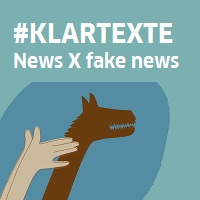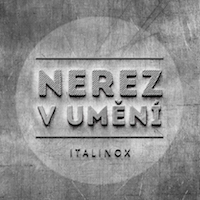
János Brückner: I don’t believe in post-ism

'Welcome' is a multimedia installation that is to stage a post-human vision. We gave up our intimacy for the benefits of technology. Surrounded by devices we live in the conditions of everlasting circle of compulsory identification. The installation reflects on the human body at the post-Internet era in two ways. The 'Likeprint' transforms viewers to printers – by filling a blank paper with "like" stamps according to numbers they create an image. Inside the container a crowd of life-scale paper puppets creates an empty yet humanistic space of replacement, thus showing our dis-identified bodies. The exhibition object itself serves as the space of emptiness, a construction that is to contain and incorporate human content. The installation is to reflect the negative aspect of such spaces, thus manifesting replacement and lack.
"Welcome" is a multimedia installation staging post-human vision. Could you tell us more about your vision / prediction of the future of our society? Are we to expect a post-post-internet age?
I don’t believe in post-ism, I guess it is a remainder of the modernist visions: we still think our “story” is “going” “somewhere”, that there is a beginning and there is a teleological end. The terms post-human and post-digital don’t refer to the future: it is the present. In my interpretation it means digital developments are more like nature for us (compared to trees, skies and so on). So this is a status quo and we have to deal with it, since it doesn’t look like that very nice utopia depicted before.
We are witnessing a great international excitement and societal discussion about migration nowadays. On the virtual platform, we are moving freely, yet we tend to keep our national heritage, belongings somehow… How do you feel about this? Do “boarders” and different cultures exist online?
The migration crisis shows very accurate and cruel how we perceive and handle these happenings in our digital and real environment. Governmental xenophobiac rhetorics for reaching popularity, one-perspective and misleading media representation on the one hand, civil activism moved by a strong and basic humanitarian and helpful motivation, desperate people fleeing in our real environment on the other hand. I feel much ashamed by what I see on the one hand, and much proud on the other hand for the people who help others in need.
It is clear we have to make our own statement, our own personal relation. I think this should happen in all area of our lifes. I also think that art has a main role in this since I consider it as an activity that helps us to wide our perspective and to step beyond our own stereotyp imagination.
Do you think there are still borders between different art scenes from different countries?
I wouldn’t call them borders, rather a difference in various patterns of cultural meanings. I almost physically feel an Eastern-European approach existing in terms of art production: a strong critical, ironic sometimes pessimistic sytyle questioning basic phenomena of our life.
But art practice doesn’t equal an art scene. Arty people can also be closeminded just like any other people, so some of the art scenes in various cities can be also seem to be closed. For me it is always a challenge – a challenge that is much beneficial – to find the ‘same language’ for people with different backgrounds, and approach them.
What do you expect from the second part of the project, the Prague Expo event on Štvanice Island? Do you think that the moment of personal meeting is an important moment within the project?
Sure, I am much looking forward the personal meeting!
Do you have any long-term "sci-fi" predictions?
The end seems to be very close…
More info about Contain[era] to be found on the project's Facebook page or on the official website. Stay tuned for profiles of other artists from the exhibition circle.





